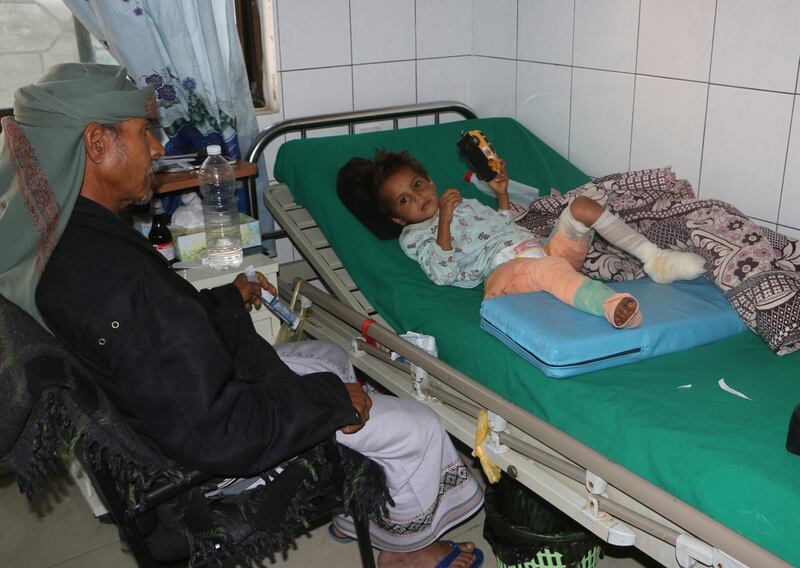ADEN // The mass departure of foreign medical professionals is contributing to the collapse of Yemen’s health system since full-scale civil war broke out in the country last year, with many people dying from a lack of skilled care, the UN’s health agency and local medical officials say.
Most of the 1,200 foreign doctors and nurses who were employed in Yemen when the war against Houthi rebels began in March last year have now left, the local office of the World Health Organisation tweeted last month.
A source in the health ministry in Sanaa confirmed the departures and said increasing numbers of Yemeni doctors were expected to leave as well “as they can get more money abroad”.
There are about 8,000 Yemeni doctors, but only a quarter are specialised, the source said.
The fighting between pro-government forces, who are supported by a Saudi-led coalition that includes the UAE, and the Iran-backed rebels has also caused heavy damage to many hospitals and health centres and created shortages of medicines, equipment and the fuel needed to run electric generators that make up for an erratic power supply.
The situation is particularly critical in Taez, where battles for control of the south-western province and its capital have raged since April last year. The fighting has been particularly fierce in Taez city, which has been under siege by rebel forces who have blocked the entry of food, medicines and other essentials.
All the foreign doctors and many of the Yemeni ones have left Taez because of the fighting and the rebel siege, according to the Taez supreme medical committee, which was formed by medical professionals to assist victims of the fighting. It said 80 per cent of the health facilities in the province, which has 20 hospitals in addition to clinics and medical centres, had closed.
A ceasefire that has reduced fighting across much of Yemen since mid-April has had little effect in Taez. The medical charity Medecins Sans Frontieres reported last month that it had treated 1,624 people injured by fighting in Taez city since April, nearly half of them civilians
While the pro-government resistance in Taez sends seriously wounded fighters abroad for treatment, for civilians this option is available only to the rich.
When Moneer Jamal, 24, was shot in the chest by a Houthi sniper in Taez city in March, his father took him from hospital to hospital in search of a doctor who could operate on him.
“After five days of suffering, my son died. The main reason for his death is that there was no doctor who could remove the bullet from his chest,” said Abdulwali Jamal, a bus driver.
Hospitals in Taez depended on foreign doctors to perform difficult procedures but they have all left, and “even Yemeni have doctors fled Taez to other provinces or countries”, said Abdul Hakeem Shamsan, a doctor on the supreme medical committee.
Many of the doctors still in Taez, who number only a few dozen, are now working for free.
“Taez depends on volunteer doctors to help injured people and patients,” said Dr Shamsan. “The Houthi rebels stopped paying the salaries of many doctors in Taez because they helped injured resistance fighters, and the Yemeni government does not pay them salaries.”
Dr Shamsan is a volunteer at Al Thawra hospital, which is one of the main medical facilities in Taez city and was damaged in rebel shelling in November.
Some of the city’s youth have launched fund-raising drives to support health facilities in Taez city. So far, they have managed to reopen a centre for prosthetic limbs.
Isam Al Batra, 34, a member of the group that reopened the centre, said they raised funds through Facebook.
“Most of the donations came from Yemenis abroad who heard about the project through Facebook,” Mr Al Batra said.
foreign.desk@thenational.ae





